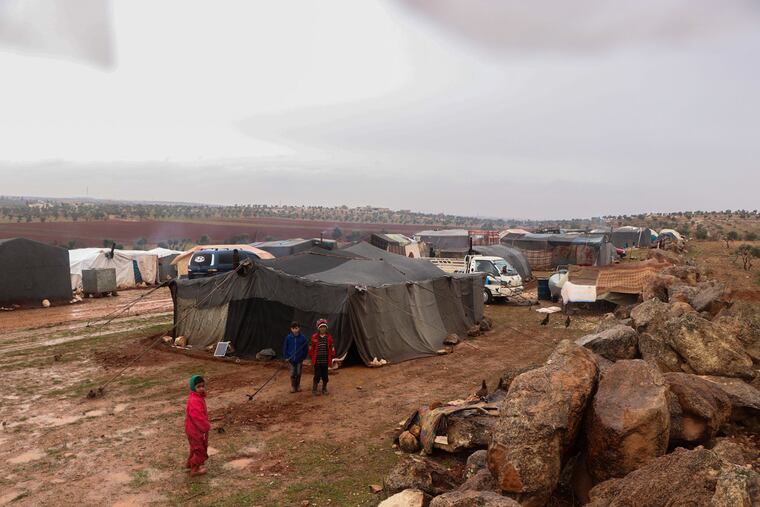In worst Syrian refugee crisis ever, will anyone help? | Trudy Rubin
Russian bombing of civilians in Syria, Turkish ethnic cleansing, and the United States' indifference leave 900,000 Syrians with nowhere to turn to.

The most urgent Syrian refugee crisis of the entire nine-year civil war has exploded since mid-December, with the potential to further destabilize Europe, or create islands of human misery from which jihadis can recruit.
Nine hundred thousand desperate men, women, and children have flooded toward the Turkish border — two-thirds of them since December — as Russian and Syrian warplanes repeatedly bomb hospitals and other civilian sites, as well as fleeing families on the road — war crimes that an indifferent world is ignoring.
U.S. and international aid agencies are scrambling to get humanitarian assistance across the Turkish-Syrian border in the dead of winter. Sheltering in tents, cars, mosques, and schools, many of these refugees had previously fled their homes in rebel-held cities and towns besieged by Syrian government forces. Now they have come to the end of the road, as the Syrian regime seeks to retake the northwestern province of Idlib, one of the last rebel-held areas.
But the ugly repercussions of Syrian and Russian war crimes in Idlib will be felt all the way to the United States.
“We’ve never seen as rapid a displacement as now because of the scale and speed,” I was told by Tue Jakobsen, CARE’s Turkey-based assistant country director, who manages its emergency response work for Northwest Syria. “With 700,000 fleeing since mid-December, this has created an unprecedented need.”
Russian and Syrian airstrikes on civilian targets in Idlib have been driving a steady stream to flee over the last nine months. “In 2019 alone, there were 85 attacks on health-care facilities in Northern Syria,” said Michelle Nunn, president and CEO of CARE USA, earlier this month. Just last month, CARE had to suspend desperately needed services at its maternity and pediatric hospital in Idlib, Nunn said, because a nearby hospital was hit by several airstrikes.
» READ MORE: Trump demolishes machinery of diplomacy when America needs it most | Trudy Rubin
“The Age of Impunity” is how David Miliband, CEO of the International Rescue Committee, refers to these attacks on civilian targets. Russia and Syria have been deliberately bombing clinics, schools, and markets for the last several years and getting away with it. Moscow was even able — through its veto power in the U.N. Security Council — to reduce the amount of desperately needed humanitarian aid coming across the Turkish border into Syria.
As for the United States, President Donald Trump’s eagerness to pull out U.S. troops from the Kurdish region in northeast Syria no doubt emboldened Moscow and Damascus to do their worst in Idlib.
But the immediate question is how to halt the refugee tsunami pouring out of Idlib before another half-million join them, and what will happen to this human flood which has nowhere to go. Turkey, which has strong ties to some rebel groups in Idlib, has sent troops into the province but cannot prevail against Vladimir Putin’s support for Bashar al-Assad.
Nor will Recep Tayyip Erdogan permit the new Syrian refugees to cross from Syria into his country. “Turkey has hosted four million Syrian refugees with little international assistance and doesn’t want another two million,” says Soner Cagaptay, author of Erdogan’s Empire: Turkey and the Politics of the Middle East.
Indeed, Erdogan had been hoping, with an apparent Trump green light, to drive out the Kurdish population from Northeast Syria and resettle two million Syrian Arab refugees in their place. This ugly goal was blocked by a strange duo: Putin, who wants the Kurds to return to Assad’s fold, and by GOP senators, who opposed Trump’s plan to pull out the U.S. troops based in the Kurdish region.
» READ MORE: Trump helps jihadis, harms Kurds in Syria | Trudy Rubin
So Erdogan must now decide how to handle this new refugee flow headed towards Turkey. Cagaptay believes the Turkish leader will wind up with “the Syrian version of the Gaza Strip along his border, two million Syrian refugees in an area not bigger than Rhode Island.” Turkey would expect the European Union to provide humanitarian aid, says Cagaptay, or else Erdogan would unleash a new refugee flood into Europe.
Needless to say, a new Gaza Strip in Syria would be a perfect setting for jihadis to recruit desperate youths.
But this scenario, which may emerge down the road, does not deal with the urgent need for humanitarian aid for a million refugees freezing in winter. Humanitarian aid agencies are overstretched, at a time when Trump is slashing the State Department budget that includes emergency assistance for such crises.
This is a moment when the United States — if its diplomacy were functional — should be pressing its supposed NATO ally Turkey, and Russia, to agree to a ceasefire in Idlib.
This is a moment when U.N. Secretary-General António Guterres should be standing on the Syrian border calling for that ceasefire. This is a moment when Guterres should be releasing a report on Russian and Syrian bombings of civilians that Moscow wants kept secret.
In the Age of Impunity, that is probably too much to hope for.
However, individuals can still act by donating to organizations that are helping the refugees: CARE, the International Rescue Committee, and Save the Children are all working to get aid across the border into Syria and keep victims alive.